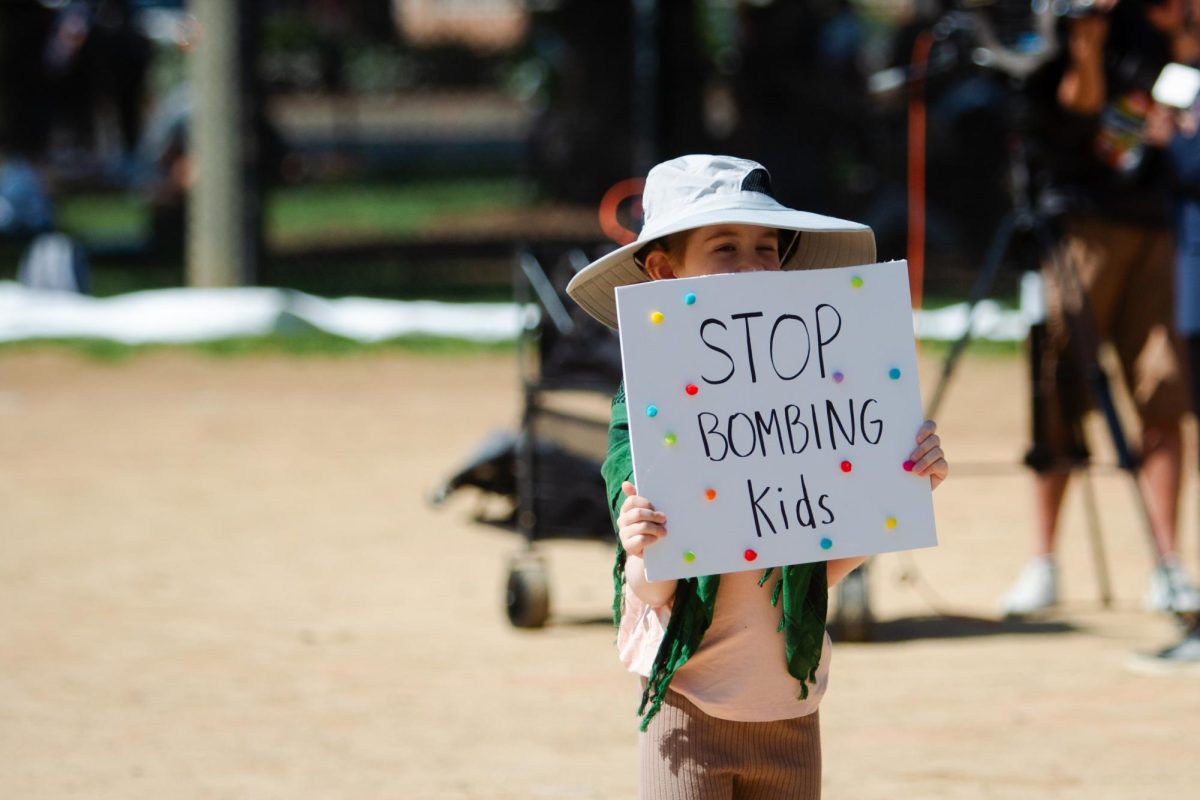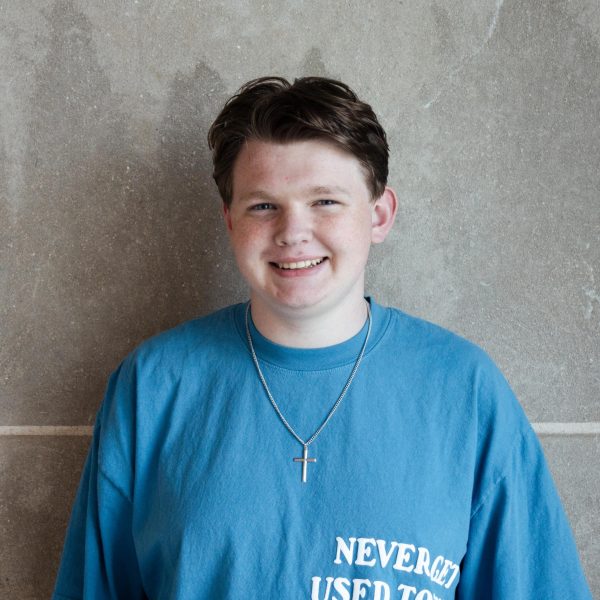The Central Times sent two journalists daily to the Democratic National Convention in Chicago from Aug. 19-22. This was made possible by the Illinois Journalism Education Association. Read more of our coverage from the DNC at centraltimes.org.
In the middle of Chicago’s Union Park, thousands of protesters gathered in traditional Palestinian keffiyehs and green paisley bandanas. Chants of “ceasefire now!” rang out as Palestinian flags blew in the air. Signs reading “FREE PALESTINE” and “STOP THE GENOCIDE” were seen at every turn.
From the main concourse of the United Center, nearly three dozen delegates of multiple faiths prayed together. Pins reading “uncommitted” and “not another bomb” were fixed to their lanyards. Leaders reiterated their right to protest, even as delegates on the floor of the convention.
March on the DNC
The Coalition to March on the DNC—a group of more than 270 organizations—planned these protests for nearly a year, fighting for a variety of causes ranging from legalization of undocumented workers to community control of police. But the coalition’s focus was clear: stand with Palestine and end U.S. aid to Israel.
“The central issue of this week of protests at the DNC: stop U.S. aid to Israel, stop the genocide, stand with Palestine [and] free Palestine,” said Hatem Abudayyeh, National Chair of the U.S. Palestinian Community Network. “All the top Democrats are complicit, they are responsible. We will hold them responsible [and] we will hold them accountable.”
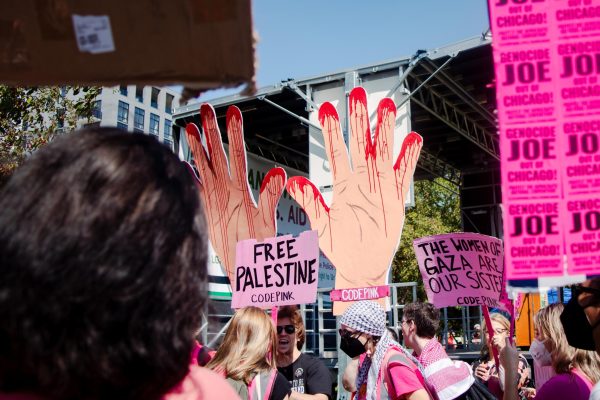
According to the coalition, more than 20,000 protesters—enough to fill the United Center to 85% capacity—marched en route towards the convention on Monday, Aug. 19. Another 11,000 protested on Thursday, Aug. 22, the final night of the DNC.
However, Chicago Police report that the number of protesters was far lower: approximately 4,000 on Monday and 3,000 on Thursday.
More than a dozen of the coalition’s member organizations are youth-led, a continuation of national trends involving the Israel-Hamas war. According to Armed Conflict Location and Event Data, there have been 1,360 student-involved demonstrations on the conflict since Oct. 7, accounting for more than 40% of all pro-Palestine protests.
“I just wanted to be a part of something bigger,” said protester José Sanchez, 23. “I wanted to be a part of changing the way we think about [the] Palestinian genocide, systemic injustices and inequality in the United States.”
Sanchez is a member of the University of Illinois-Chicago chapter of Students for a Democratic Society, a member of the coalition. He thinks protests like this will “definitely be a big change” to youth civic engagement.
Protesters rallied at Union Park before marching down Washington Boulevard, stopping at a park less than a thousand feet from the entrance to the United Center.
Impact on the convention
The coalition hoped to pressure the convention to present a more deliberately pro-Palestinian message through its speeches and caucuses. Multiple speakers were proposed, including Illinois state Rep. Abdelnasser Rashid and Georgia state Rep. Ruwa Romman.
“The DNC is concerned about the tens of thousands that are going to [protest]; they’re concerned about unity,” Abudayyeh said. “The entire world is watching. The event of the season [is] in Chicago at Union Park, not the United Center.”
But from within the DNC, the protests went largely unnoticed. Even as the coalition chanted “free, free, free Palestine” just 900 feet from the United Center on Monday, many delegates and attendees say they never heard them.
“It has not affected my experience at all,” said Paul Harper, a delegate from Missouri’s third congressional district. “I really have not seen the protesters that everyone [is] talking about.”
For some, the small visible impact on the convention was indicative of a larger struggle protesters have faced since the start of the Israel-Hamas war.
“They’re very ineffective at getting people in this room to pay attention to what the f— is going on, but overall I think that we shouldn’t stop,” said progressive activist Hasan Piker, who has 2.7 million followers on the streaming platform Twitch. “Eventually, hopefully [Democrats] will respond to public pressure.”
A week before Monday’s march, a federal judge issued a 24-page ruling that blocked the coalition’s proposal for a 2.3 mile route that would’ve taken protesters further west and closer to the United Center. Instead, their route lasted 1.1 miles, centering around Park 578.
According to the ruling, the coalition’s proposed route would “introduce major safety concerns” and “disrupt […] transportation to and from the United Center.”
But even with the adjusted route, many attendees noted a significant increase in traffic on Monday as protesters marched close to the United Center.
“There [were] so many protesters and it definitely made it harder for the buses to get to the United Center,” said Beatrice Schierer, a 17-year-old delegate from Minnesota’s seventh congressional district. “Several buses weren’t even able to ever make it to the United Center, so they weren’t able to be there the first night, which is a huge disappointment.”
Some protesting did make its way inside official DNC spaces. During a Youth Council meeting on Thursday, a protester interrupted a speech to yell “the DNC is normalizing genocide and that should terrify everyone; no wonder this room is so empty.”
In response, other audience members yelled back “get out” and “bye” to the protester. She was escorted out of the room shortly thereafter.
“I’ve been to a few events today where protesters have [made their] voice [heard],” Illinois state Rep. Janet Yang-Rohr said. “Even when sometimes it might disrupt the program, the good thing is the panelists understand [that] they’re there because they care. Everyone has been respectful of that right to voice their opinions and to voice those thoughts.”
Uncommitted delegates
During Tuesday’s roll call, 52 delegates cast their vote as “present,” many in opposition to Democratic Presidential nominee Kamala Harris’ policy on the Israel-Hamas war.
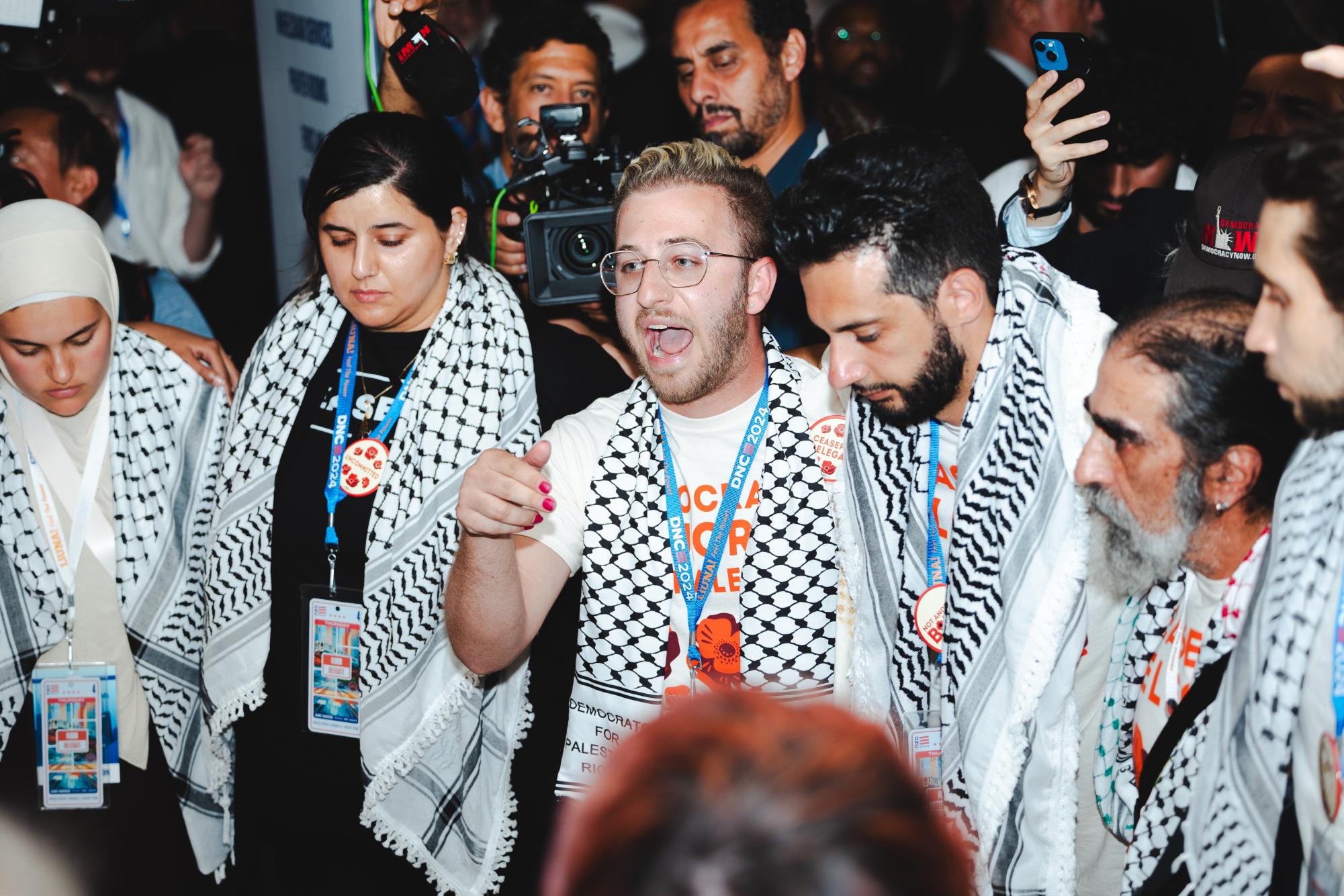
“I just found it fascinating to learn from them, learn from their experiences and why they were voting ‘present’ at roll call,” said Isaac Winkler, a 17-year-old delegate from Minnesota’s fifth congressional district. “[They’re] people who aren’t satisfied with the current action that’s being taken. Obviously there are complexities up and down the ballot, especially relating to the issues in Israel and Palestine, and I think that’s a large part of it.”
Winkler, the youngest delegate at the DNC, cast his vote for the Harris-Walz ticket, although the same couldn’t be said for many in his delegation. After 18.9% of Democrats voted “uncommitted” in Minnesota primaries, 10 delegates from the state voted “present” at the DNC.
The uncommitted movement continued across the U.S. In Michigan, 13% of Democrats voted uncommitted. In North Carolina, 12.7% of Democrats cast their vote for “no preference.” Nationwide, more than 650,000 uncommitted votes were cast in Democratic primaries.
“That is a substantial movement [and] I appreciate the fact that they’re in there,” Abudayyeh said. “They think that they can maybe make a change from within. That may not be the opinion of myself or a number of organizations that are part of this coalition, but inside-outside strategy is not bad.”
The 52 uncommitted delegates accounted for only 1.1% of all delegate votes at the DNC. Even in Minnesota, Winkler felt like “everybody [was] excited for the Harris-Walz ticket.”
After Harris won the Democratic nomination, some uncommitted voters have voiced their support for her campaign in the general election.
“Even for the delegates that voted uncommitted at the convention, they know what the stakes are,” said Henry Pahlow, former Vice Chair of High School Democrats of America and a delegate from Wisconsin. “In November, they’re going to vote for the Democratic ticket.”
According to Abudayyeh and Piker, that’s indicative of broader lack of responsiveness to Democrat voters from the party’s leadership.
“Stay active, take it to the streets, protest [and] don’t think that voting is going to be the end-all-be-all,” Piker said. “[Youth] are the future and hopefully we’ll be able to get the Democratic Party at some point to meet our demands.”
After weeks of negotiations with uncommitted delegates, the DNC agreed to host a “Democrats for Palestinian Human Rights” panel on Monday afternoon. The panel included Minnesota Attorney General Keith Ellison and former Rep. Andy Levin (D-Mich.), among others.
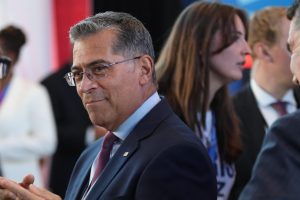
“They’re trying to influence their leadership [and] they may be having effect,” said Rory Hoskins, a delegate from Illinois’ seventh congressional district. “I think that most convention-goers are somewhat sympathetic to their cause. No one wants to see a war.”
Additionally, a group of approximately three dozen uncommitted delegates staged a sit-in at the DNC on Wednesday night. After Jon Polin and Rachel Goldberg spoke—the parents of an American citizen currently being held hostage by Hamas—the delegates had hoped to lobby the DNC to include a Palestinian-American speaker on Thursday.
Despite calls from Rep. Alexandria Ocasio-Cortez (D-N.Y.), Rep. Ilhan Omar (D-Minn.) and others, their demands went unmet. Delegates went back inside the United Center at 8 p.m. on Thursday without a Palestinian speaker on any night of the convention.
“You’ve got to just keep it going; there’s not really anything else you can do,” Piker said. “You have to hope that you keep communicating these clear-cut demands [and] desires that the overwhelming majority of the American public also agree on: a ceasefire in Gaza. Inevitably, the dam will break.”
The First Amendment
Over a dozen people interviewed at the DNC—from delegates and lawyers to congressmen and governors—voiced their support of protester’s First Amendment rights, which protects freedom of speech, religion, the press, assembly and the right to petition.
“As a civil rights constitutional lawyer, we respect the First Amendment,” said Ben Crump, the lawyer who represented George Floyd and the residents of Flint, Mich. “Everybody should have the right to express their opinions, a right to lawful assembly [and] a right to protest, but you do it in a legal manner. Our country was founded by a group of protesters protesting the British taxes on tea. We always have to cherish each and every amendment, they are there for a reason.”
Despite disagreements over how to address the Israel-Hamas war, Rep. Steny Hoyer (D-Md.) and others echoed agreement over the right to protest.
“Protests [are] democracy,” Hoyer said. “Expressing your opinions, whether you agree or disagree with the government [is] what our democracy is about. It’s good for the country, it’s good for democracy and it’s good for us.”
Others voiced concerns over the limitations of the First Amendment, such as those on disorderly conduct and failure to obey police. Across the convention’s four days, Chicago Police made 74 arrests, including 10 protesters who breached the outer security fences on Monday.
“I hope that everyone feels the right to express their opinion, the First Amendment is so important,” Beshear said. “But the state, the city and the convection have to be orderly, so I know everyone’s trying to strike the right balance.”
Ceasefire in Gaza
In Harris’ acceptance speech on Thursday night, she outlined her policy on the Israel-Hamas war. The nominee for president advocated for “Israel’s right to defend itself” while also saying “what has happened in Gaza over the past 10 months is devastating” and that she was “working around the clock, because now is the time to get a hostage deal and a ceasefire deal done.”
“Vice President Harris has shown that she’s willing to engage with people who hold those concerns, and she’s actively working for a ceasefire in Gaza,” Pahlow said. “As this campaign continues to proceed, she’ll continue to bring those voices to the table and empower everyone within the party, and that’s why she’s been able to so effectively unite the party around her.”
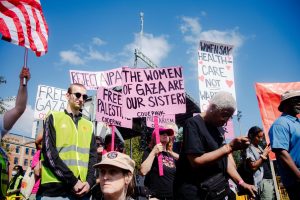
Despite the endorsement from Harris, calls for a ceasefire have received pushback from pro-Israel lobbying groups, such as American Israel Public Affairs Committee. According to data from the Federal Election Commission, the organization has spent $44.8 million on lobbying and campaign donations during the 2024 election cycle, and has been widely attributed for the re-election losses of progressives Rep. Cori Bush (D-Mo.) and Jamaal Bowman (D-N.Y.).
Bush sponsored HR786, which would urge the President to immediately facilitate a ceasefire in the Israel-Hamas war while sending humanitarian aid to Gaza. The bill was also co-signed by 18 Democrats (including Bowman) part of a growing list of congressmen who have called for a permanent ceasefire in Gaza.
Although only 52 delegates voted “present” at roll call, more than 300 signed a pledge to become “ceasefire delegates.” The Democratic Party platform—passed on Monday, Aug. 19—also called for an “immediate and lasting ceasefire.”
“They are speaking up, many of them, for issues around peace for Palestine, for a ceasefire, for the release of hostages and an approach towards peace,” said Rep. Steven Horsford (D-Nev.), Chair of the Congressional Black Caucus. “That is something all of us can work towards.”
Jay Deegan contributed to this story.




